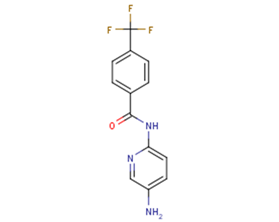
TFAP
CAS No. 1011244-68-0
TFAP( TFAP )
Catalog No. M19375 CAS No. 1011244-68-0
TFAP is a selective cyclooxygenase-1 (COX-1) inhibitor.
Purity : >98% (HPLC)
 COA
COA
 Datasheet
Datasheet
 HNMR
HNMR
 HPLC
HPLC
 MSDS
MSDS
 Handing Instructions
Handing Instructions
| Size | Price / USD | Stock | Quantity |
| 5MG | 65 | In Stock |


|
| 10MG | 102 | In Stock |


|
| 25MG | 196 | In Stock |


|
| 50MG | 356 | In Stock |


|
| 100MG | 530 | In Stock |


|
| 200MG | Get Quote | In Stock |


|
| 500MG | Get Quote | In Stock |


|
| 1G | Get Quote | In Stock |


|
Biological Information
-
Product NameTFAP
-
NoteResearch use only, not for human use.
-
Brief DescriptionTFAP is a selective cyclooxygenase-1 (COX-1) inhibitor.
-
DescriptionTFAP is a cell-permeable pyridinyl-benzamide compound that acts as a COX-1-selective inhibitor by targeting the enzyme's active site. TFAP displays analgesic properties in mice and rats in vivo without long-term cytotoxic effects. Unlike COX-2-inhibiting analgesics such as aspirin, TFAP is shown not to cause gastric damage in rats in vivo.
-
In VitroTFAP is a selective cyclooxygenase-1 (COX-1) inhibitor, with an IC50 of 0.8 μM, while that against COX-2 is over 200 μM.
-
In Vivo——
-
SynonymsTFAP
-
PathwayChromatin/Epigenetic
-
TargetCOX
-
RecptorCOX-1
-
Research Area——
-
Indication——
Chemical Information
-
CAS Number1011244-68-0
-
Formula Weight281.23
-
Molecular FormulaC13H10F3N3O
-
Purity>98% (HPLC)
-
SolubilityDMSO : ≥ 155 mg/mL; 551.15 mM
-
SMILESO=C(Nc1ccc(N)cn1)c2ccc(cc2)C(F)(F)F
-
Chemical NameN-(5-amino-2-pyridinyl)-4-(trifluoromethyl)-benzamide
Shipping & Storage Information
-
Storage(-20℃)
-
ShippingWith Ice Pack
-
Stability≥ 2 years
Reference
1.Kakuta H, et al. Identification of urine metabolites of TFAP, a cyclooxygenase-1 inhibitor. Bioorg Med Chem Lett. 2010 Mar 15;20(6):1840-3.
molnova catalog



related products
-
Lornoxicam
Lornoxicam (chlortenoxicam) is a new nonsteroidal anti-inflammatory drug (NSAID) of the oxicam class with analgesic, anti-inflammatory and antipyretic properties.
-
Tilmacoxib
Tilmacoxib (JTE-522) is a potent, selective inhibitor of cyclooxygenase-2 (COX-2) that inhibits human recombinant COX-2 with IC50 of 85 nM.
-
(+)-Catechin pentaac...
(+)-Catechin pentaacetate (Catechin pentaacetate) is an esterified derivative of catechin with the potential to improve intestinal morphology and function and positively modulate the microbiome, and reduce iron and zinc transport proteins in the duodenum.



 Cart
Cart
 sales@molnova.com
sales@molnova.com


